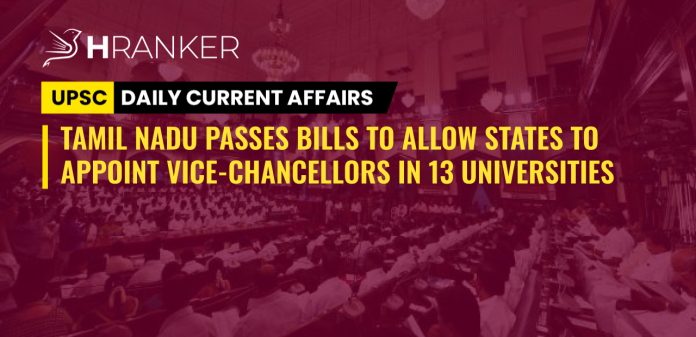WHAT’S IN NEWS: Tamil Nadu has passed two Bills proposing to take away the Governor’s powers to appoint VCs of state universities under the aegis of the Higher Education Department. Which other states have done this and why?
HIGHLIGHTS OF THE TWO BILLS:
- The Tamil Nadu Universities (Amendment) Act, 2022, which covers 12 universities in the state substitutes the expression ‘CHANCELLOR’ in the original Act with ‘GOVERNMENT’ with regard to both appointment and removal of VCs. In a separate bill, changes were also made in the Chennai University Act, 1923 with similar intent.
- Both the Bills stress that “Every appointment of the Vice-Chancellor shall be made by the government from out of a panel of 3 names” recommended by a search-cum-selection committee.
- At present the Governor is the chancellor of state universities and has the power to pick a VC from the shortlisted names.
- The bills also seek to empower the state government to have the final word on removal of VCs, if needed.
- Removal will be carried out based on inquiries by a retired High Court Judge or a bureaucrat who has served at least as a Chief Secretary.
- The ‘Statement of Objects and Reasons’ of the Bills also says that the Secretary of Finance will be among the syndicate members in all the universities.
CONCERNS OF TAMIL NADU GOVERNMENT:
CM of the state, Mr. Stalin said there was a need to empower the state government to select VCs and not doing so would create a ‘big impact’ on the higher education.
According to the CM, earlier, the practice was for the Governor to consult the state government before selecting VCs in the state-run universities, but there had been a change in the recent past.
The CM said, “As the State government is not able to appoint the VCs for universities under its control this has led to various confusion in the overall varsity administration. It is against the ideals of democracy,”
OTHER STATES’ PROVISIONS:
The Gujarat University Act, 1949 states that, “the Vice-Chancellors shall be appointed by the State Government from amongst three persons recommended by a search-cum-selection committee.
The Telangana Universities Act, 1991 states that the search committee shall “submit a panel of three persons to the Government in alphabetical order and the Government shall appoint the Vice-Chancellor from out of the said panel.”
Karnataka, Jharkhand and Rajasthan state laws underline the need for ‘concurrence’ or ‘consultation’ between the state and Governor.
ROLE OF UNIVERSITY GRANTS COMMISSION (UGC):
Education comes under the Concurrent List, but entry 66 of the Union List, “coordination and determination of standards in institutions for higher education or research and scientific and technical institutions” gives the Centre substantial authority over higher education.
The UGC plays that standard-setting role, even in the case of appointments in universities and colleges.
According to UGC (Minimum Qualifications for Appointment of Teachers and other Academic Staff in Universities and Colleges and other Measures for the Maintenance of Standards in Higher Education) Regulations, 2018, the “Visitor/Chancellor” – mostly the Governor in states – shall appoint the VC out of the panel of the names recommended by the search-cum-selection committees.
Higher educational institutions, particularly those that get UGC funds, are mandated to follow its regulations. And these are usually followed without friction in the case of central universities but are sometimes resisted by the states in the case of state universities.
SUPREME COURT’S OBSERVATIONS:
A Bench of Justices M R Shah and B V Nagarathna said, “Any appointment as a Vice Chancellor contrary to the provisions of the UGC Regulations can be said to be in violation of the statutory provisions, warranting a writ of quo warranto”.
It said every subordinate legislation of the UGC, in this case the one on minimum standards on appointments, flows from the parent UGC Act, 1956. Therefore, UGC Regulations become part of the Act.
In case of any conflict between state legislation and central legislation, central legislation shall prevail by applying the rule/principle of repugnancy as enunciated in Article 254 of the Constitution as the subject ‘education’ is in the Concurrent List Seventh Schedule of the Constitution.
NEED FOR SUCH BILLS:
In a democracy, the elected state government has the responsibility of running higher education institutions for offering the best quality education. Therefore, the state Government responsible for maintaining the quality of education.
Tamil Nadu Chief Minister Stalin said, “The issue pertains to the rights of the state, its university education and that of the government elected by the people.”
The power given to the Governor to act as Chancellor of state Universities is bestowed by the acts of respective Universities as promulgated by the state and not by the Constitution of India. Therefore, the state has authority to amend the University act through the legislature and retain the power of appointment of Vice-chancellor in Universities with state Government.
Punchhi Commission has also recommended that the convention of making the Governors as chancellors of universities should be done away with.
Kothari commission report mandates the appointment of some scholar or academician as Chancellor of Universities who understands the education system and has requisite academic prudence to act as Chancellor.
The Chancellor (Governor) has no accountability for the functioning of universities, so the Vice Chancellor appointed by the Governor might lack integrity and commitment.
States have administrative functions and give funds to universities, so they must have a say in the appointment of VCs.
The state governments feel that the Governor may impose the ideology of political parties and can be partisan in discharge of its duties. The in the states ruled by the political party other than the party at centre.
CONCLUSION:
The Universities must exhibit rationality, neutrality, and cardinal virtues in all processes so that innocent students get an absolutely free environment for fearless thinking & expression in the larger interest of society. And there’s a need that Universities should be made free of interference of political parties in state or centre. This will help us accomplish in global rankings.




